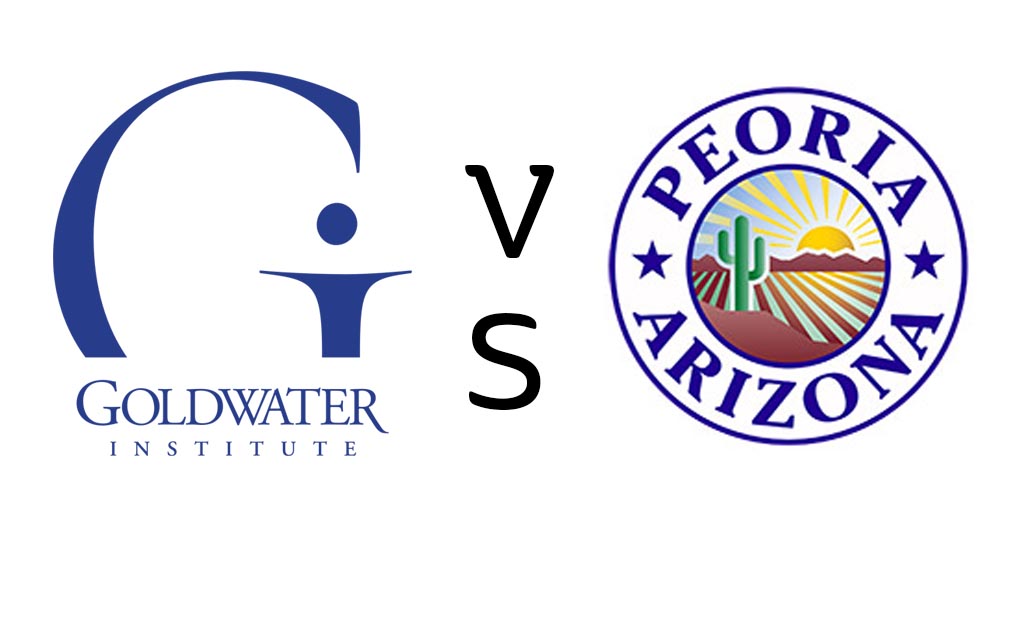Institute also releases new report on failed private university in Gilbert
PHOENIX – Today taxpayers represented by the Goldwater Institute filed suit against the City of Peoria to stop it from giving away more than $2.5 million in taxpayer money to Huntington University and its landlord, both private businesses, without promising local taxpayers anything in return.
To receive this taxpayer money, Huntington merely has to get accredited, offer classes, and enroll students—all things it would do in its normal course of business. Huntington’s landlord, a private real-estate firm, will also receive taxpayer money to renovate its own building for Huntington’s use. The City and taxpayers receive no benefit from this subsidy to the building owner; it only benefits the landlord, which will profit from the lease.
“Peoria is paying a business simply to do what it would do anyway. The taxpayers get nothing in return for their money,” said Christina Sandefur, executive vice president at the Goldwater Institute, and one of the attorneys who filed the lawsuit. “Just as it would be wrong for the government to give taxpayer money to Starbucks to serve coffee, or to McDonald’s to sell hamburgers, it’s wrong—and illegal—to give money to Huntington to open a campus and offer classes.”
This Huntington University deal violates the Arizona Constitution, which makes it illegal for the City to “give or loan its credit in the aid of, or make any donation or grant, by subsidy or otherwise, to any . . . corporation.” In its landmark ruling in Turken v. Gordon, a case also brought by the Goldwater Institute, the Arizona Supreme Court has found that public expenditures must be for public purposes and if public expenditures create private benefits, the government must receive fair consideration in return. Moreover, indirect benefits—such as general economic improvement or potential job growth—are not acceptable returns.
Taxpayer subsidies take the risk away from private businesses and put it on taxpayers. If Huntington is successful, the university reaps the reward. But if the venture fails, the taxpayers and students—not the university—shoulder the costs.
In 2015, the Town of Gilbert subsidized Saint Xavier, a private university, so it would locate in downtown Gilbert. The university was only open for one semester before shutting its doors, leaving students with thousands in student loan debt and taxpayers on the hook for $36 million in bond payments.
The Goldwater Institute today released a new report on the failed Gilbert project, its victims, and the potential liability for city taxpayers. The report’s author interviews one graduate student who is now on the hook for repaying $20,000 in student loans for his first year at Saint Xavier, which was cut short by one semester and left him with credits that don’t transfer to other MBA programs.
In August 2016, the Goldwater Institute sent Peoria a letter urging the City to reconsider its subsidy to Huntington because it violates the Arizona Constitution. The City declined to change its plans, leaving the Institute with no recourse but to go to court to protect taxpayers.
“Cities have important jobs to do—like keeping people safe and solving crimes,” said Sandefur. “The $2.5 million Peoria is handing over to private businesses to do nothing extra or special for local taxpayers could fund 60 percent of the cost of the City’s police criminal investigations unit for an entire year. The City’s priorities are wrong and illegal.”
The Institute is representing three Peoria residents and taxpayers who object to having their local taxes spent to subsidize a private university rather than on essential city services.
Read more about Schires v. Peoria here.
Read the new report Economic Dysfunction: Cities Make Risky Bets to Lure Private Universities here





